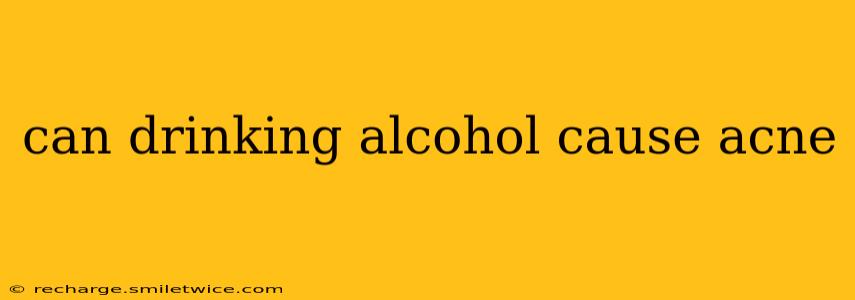Acne, that frustrating skin condition characterized by pimples, blackheads, and whiteheads, affects millions. While genetics and hormonal fluctuations play significant roles, many wonder about the influence of lifestyle factors, including alcohol consumption. So, can drinking alcohol cause acne? The answer isn't a simple yes or no. The relationship is complex and multifaceted, but the evidence suggests a connection, albeit an indirect one.
How Does Alcohol Affect Your Skin?
Alcohol's impact on acne isn't a direct, causal relationship like, say, a specific bacteria causing an infection. Instead, it's more about how alcohol affects various bodily processes that, in turn, can exacerbate acne. Several mechanisms are implicated:
-
Dehydration: Alcohol is a diuretic, meaning it increases urine production. This leads to dehydration, which can dry out your skin, triggering your skin to produce more oil to compensate. This increased oil production can clog pores, contributing to acne breakouts.
-
Inflammation: Alcohol consumption can trigger systemic inflammation throughout the body. This inflammation can worsen existing acne and potentially even trigger new breakouts. Inflammation is a key player in the development of acne lesions.
-
Hormonal Imbalances: Alcohol can disrupt hormone balance, particularly in women. Hormonal fluctuations are a major factor in acne development, so any disruption caused by alcohol can worsen existing acne or even initiate new breakouts.
-
Sleep Disruption: Alcohol can interfere with sleep quality. Insufficient sleep is linked to increased cortisol levels, a stress hormone that can negatively impact skin health and potentially worsen acne.
-
Nutrient Deficiencies: Heavy alcohol consumption can interfere with nutrient absorption, leading to deficiencies in vitamins and minerals essential for healthy skin. These deficiencies can further compromise skin health and contribute to acne problems.
Does Alcohol Directly Cause Acne?
No, alcohol doesn't directly cause acne in the way a bacteria might. It doesn't contain any inherent acne-causing agents. However, its indirect effects on the body can significantly worsen existing acne or contribute to its development.
What Types of Alcohol Are Worst for Acne?
While all alcoholic beverages can contribute to the aforementioned negative effects, those higher in sugar content may exacerbate acne even more. Sugary drinks like mixed cocktails and sugary wines can increase inflammation and insulin resistance, further promoting acne breakouts.
Can Cutting Back on Alcohol Clear Up My Acne?
Many individuals report a noticeable improvement in their acne after reducing or eliminating alcohol consumption. This suggests a strong correlation between alcohol intake and acne severity. While not a guaranteed cure, reducing alcohol intake is often a beneficial step in managing acne.
What Else Can I Do to Improve My Acne?
Addressing acne requires a holistic approach. Besides reducing alcohol consumption, consider these strategies:
-
Maintain a healthy diet: A balanced diet rich in fruits, vegetables, and whole grains supports overall skin health.
-
Get enough sleep: Aim for 7-9 hours of quality sleep per night.
-
Manage stress: Stress can exacerbate acne. Practice stress-reducing techniques like yoga, meditation, or deep breathing.
-
Maintain good hygiene: Wash your face gently twice a day with a mild cleanser.
-
Consult a dermatologist: A dermatologist can provide personalized advice and treatment options for your specific acne type.
Conclusion:
While alcohol doesn't directly cause acne, its indirect effects on the body—dehydration, inflammation, hormonal imbalances, sleep disruption, and nutrient deficiencies—can significantly worsen the condition. Reducing or eliminating alcohol consumption can be a beneficial step in managing acne, but it's crucial to combine this with other healthy lifestyle choices and potentially seek professional dermatological advice for comprehensive acne management. Remember, everyone's skin is different, so what works for one person might not work for another.
